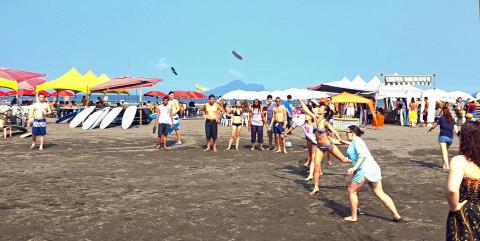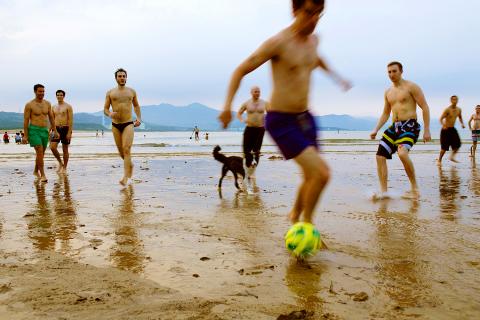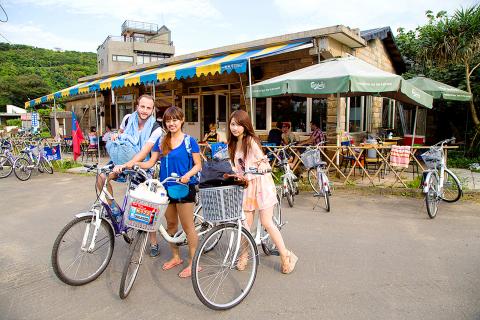When Chris Carnahan founded Taipei Trends in 2011, he envisioned the blog to be a space to tell the world everything about Taiwan — its food, its culture and its people. Since then, he has assembled a small team of dedicated writers and editors, and in addition to doing round-ups of eateries and entertainment spots, they’ve been organizing regular meet-ups where they take groups of people out to explore Taiwan through bike rides, snorkeling, cliff jumping, paragliding and bungee jumping.
If that’s not enough, they’ve also gone laser tagging, ate to their hearts’ content at potlucks, ventured inside 200-year-old homes in Tainan and played with monkeys in Kaohsiung. According to Carnahan, turn up at these events, like readership of their Web site, is largely half Taiwanese and half expat.
On Saturday, Taipei Trends will be hosting Fulong Full On, an all-day party at Fulong Beach, with activities such as water balloon tosses, relay races and sand sculpture competitions. The event will be the third large-scale beach party Taipei Trends has organized, the first being in Waiao and the one last year being a two-day camp in Fulong where they rented cabins at a campground. For this year’s Fulong Full On, they decided to scale back a bit, although there will still be the essentials: food, drinks, live music and DJs.

Photo courtesy of Taipei Trends
CULTIVATING COMMUNITY
Like many expats, Carnahan — who initially came here on an exchange program and decided to stay on — was drawn to the allure of Taiwan being under-explored and relatively unknown to the rest of the world. Great hiking trails and surf spots are everywhere, and yet not many people, even locals, know of their existence.
One thing that’s growing, Carnahan has noticed, is the number of niche groups who are organizing events for people to get together to explore the outdoors or enjoy artsy happenings in the city.

Photo courtesy of Taipei Trends
This is something he missed while working a brief stint in Shanghai, a city which he says, “has tons of connected people that know what’s happening around town, but where there is actually nothing really substantial going on, especially in art and recreation.”
Unlike some long-time residents, Carnahan doesn’t believe that Taiwan should remain a secret. Taipei is a great city on par with Hong Kong and Tokyo, he says, while Taiwan also has much to offer artists and adventurers.
“It should be cultivated by similarly adventurous people who want to preserve the culture and strong identity of Taiwan, before it’s quietly overrun by money-hungry real-estate companies and [Chinese] tourists,” Carnahan says.

Photo courtesy of Taipei Trends
TURNING OF THE TIDE?
But maybe the tide is turning. Outdoor activities, especially beach activities, are slowly becoming more acceptable.
“Fulong has a great community of people who encourage their kids to go out and play in the water and learn how to surf,” Carnahan says.
Over the years, he’s seen an increase in free divers, scuba divers and surfers, all of whom he hopes the Taipei Trends community will become more acquainted with.
The idea, Carnahan says, is to “work with them to spread the idea of beach culture, before all the beaches are taken over by commercial interests.”
He adds that some events in the past have done a bad job at promoting beach life — people go to these parties and litter, cause problems and never end up going in the water. Beach culture, Carnahan says, is not defined by spring break or music festivals, but it’s about hanging out at the beach, surfing and of course, playing in the water.
“If they wanted to go to a club, they could have just stayed in Taipei.”
This is why Carnahan didn’t want to emphasize too heavily on the “party” aspect when getting the word out about Fulong Full On. Rather, he says, it should also be mingling, taking a dip in the ocean and simply having a good time. Taipei Trends has also informed the local police and tourism bureau of the event and together with a team of volunteers, they will be combing the beach for garbage the next morning.
On that note, if you’re looking for some fun in the sun, head out to Fulong Beach on Saturday morning. If you’re looking to rave, then perhaps you’re better off taking refuge at one of the many night clubs playing similar EDM beats in Taipei.

This is the year that the demographic crisis will begin to impact people’s lives. This will create pressures on treatment and hiring of foreigners. Regardless of whatever technological breakthroughs happen, the real value will come from digesting and productively applying existing technologies in new and creative ways. INTRODUCING BASIC SERVICES BREAKDOWNS At some point soon, we will begin to witness a breakdown in basic services. Initially, it will be limited and sporadic, but the frequency and newsworthiness of the incidents will only continue to accelerate dramatically in the coming years. Here in central Taiwan, many basic services are severely understaffed, and

Jan. 5 to Jan. 11 Of the more than 3,000km of sugar railway that once criss-crossed central and southern Taiwan, just 16.1km remain in operation today. By the time Dafydd Fell began photographing the network in earnest in 1994, it was already well past its heyday. The system had been significantly cut back, leaving behind abandoned stations, rusting rolling stock and crumbling facilities. This reduction continued during the five years of his documentation, adding urgency to his task. As passenger services had already ceased by then, Fell had to wait for the sugarcane harvest season each year, which typically ran from

It is a soulful folk song, filled with feeling and history: A love-stricken young man tells God about his hopes and dreams of happiness. Generations of Uighurs, the Turkic ethnic minority in China’s Xinjiang region, have played it at parties and weddings. But today, if they download it, play it or share it online, they risk ending up in prison. Besh pede, a popular Uighur folk ballad, is among dozens of Uighur-language songs that have been deemed “problematic” by Xinjiang authorities, according to a recording of a meeting held by police and other local officials in the historic city of Kashgar in

It’s a good thing that 2025 is over. Yes, I fully expect we will look back on the year with nostalgia, once we have experienced this year and 2027. Traditionally at New Years much discourse is devoted to discussing what happened the previous year. Let’s have a look at what didn’t happen. Many bad things did not happen. The People’s Republic of China (PRC) did not attack Taiwan. We didn’t have a massive, destructive earthquake or drought. We didn’t have a major human pandemic. No widespread unemployment or other destructive social events. Nothing serious was done about Taiwan’s swelling birth rate catastrophe.